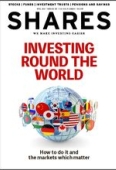Archived article
Please note that tax, investment, pension and ISA rules can change and the information and any views contained in this article may now be inaccurate.
Find out why companies with big tangible asset backing are potential money spinners

With AI (artificial intelligence) the flavour of the month and investors focused on intangible assets such intellectual property and brand value, investors may be under valuing real, tangible assets lurking on balance sheets.
The value of tangible assets has been a major feature of recent mergers and acquisition activity in the automotive retailer market.
When Lookers (LOOK) received a knockout all-cash bid (20 June) from Canadian dealerships operator Alpha Auto the deal was struck at 35% premium to the prior closing price.
It became the latest quoted car retailer to be taken over, following on from successful takeovers of Marshall Motor and Cambria Automobiles along with Pendragon (PDG) which has also drawn bid interest. One the drivers of the deals seems to be the significant freehold property owned by the operators.
This article scours the UK market for companies where hard tangible assets represent a substantial chunk of enterprise value or the total value of a company including net debt.
It does not have to be freehold property backing, but hard assets in general. For example, mining and drilling equipment specialist Capital (CAPD) has approximately £200 million of plant and machinery on its balance sheet.
The enterprise value of the business is £205 million and net debt is low at £22 million. In other words, any acquirer would get the future profit stream from those assets almost for free. Historically, the profit and return on capital have been fairly good.
The business has generated an average 16% return on capital employed over the last five years and book value per share has grown at a compound annual growth rate of 18% a year.
An acquirer would need to pay a premium for control of the business but even so, the shares look vulnerable to a takeover. Another benefit of real assets is they tend to keep pace with inflation which provides a natural hedge against a general rise in prices.
SEARCH FOR UNDERPRICED ASSETS
Using Stockopedia software we have screened the UK market for companies with a high proportion of tangible assets to enterprise value and low debts.
Given merger activity in the sector it should as no surprise to find automotive retailer Vertu Motors (VTU:AIM) on the list. Net fixed tangible assets are around £400 million, roughly the same as enterprise value.
We highlighted Vertu Motors in an article in May 2022 at a price of 51p saying the Bristol Motors retailer looks too cheap for its highly cash generative business and strong property asset backing. The company has grown its book value by 7.6% a year over the last five years.
Supermarket Sainsbury’s (SBRY) has been targeted in the past for the value of its freehold property. Its largest shareholder Qatari Investment Authority fund made an unsuccessful takeover approach in 2007.
Private equity firms have also considered bids with plans to split the property portfolio from the operating company. The value of net property, plant and machinery on Sainsbury’s balance sheet is £13.5 billion which is greater than the £11.7 billion enterprise value of the group.
There are few things more tangible than houses. Housebuilders feature heavily on the list with many trading below tangible book value. Unlike examples discussed so far, the bulk of the value is in inventories which represent houses yet to be sold.
Bellway (BWY) has one of the lowest price to tangible assets ratio among the housebuilders implying the shares trade at a 30% discount.
Enterprise value is £2.1 billion (net cash of £300 million) while the value of inventories is £4.4 billion. Rising interest rates and the spiralling cost of mortgages explains the big discount to tangible asset value across the sector as demand softens and volumes fall.
Analysts at Moody’s predict UK house prices could fall 10% this year and double that if the economy enters recession which looks more likely with two-year UK bond yields breaching 5.5%, the highest since 2008.
After peaking at close to £37 in the spring of 2021 Bellway shares has lost half their value. During the global financial crisis, the shares dropped 70% from their peak.
This time around though the balance sheet is far healthier with net cash suggesting the business can weather a deep recession. During the last housing crisis, it was rumoured that some hedge funds were looking to invest in the beaten-up housebuilders to run them for the implied cash run-off.
The biggest risk with the strategy is that house prices fall steeply, cutting the profit implied in the stock of unsold houses. But the big discount to tangible book value provides a decent margin of safety.
SHARES’ BEST ASSET-BACKED PICK
MARSTON’S (MARS) 29.7p
Market Cap: £195 million
Pubs group Marston’s (MARS) has bounced back strongly from the pandemic and is continuing to perform with first half sales to 1 April up 10% and momentum continuing into the second half.
Yet the shares trade roughly where they were in March 2020 and at a 77% discount to tangible book value. While the shares did not meet our strict net debt to tangible assets threshold of 30%, strong cash generation, a focus on debt reduction and strong freehold property backing means they are very underappreciated.
Also, the book value is likely understated as demonstrated by the sale of non-core assets at a 39% premium during the first half and a further £50 million to £60 million of non-strategic disposals slated for the second half.
The freehold property estate is valued at £1.8 billion with £1.2 billion of net debt, implying £600 million of equity value compared with a £200 million market capitalisation. Fund manager Mark Wright at Momentum Global Investment highlights Marston’s share of its joint-venture with Carlsberg (CARL-B:CPH) could be worth around £250 million.
‘I strongly believe somebody will look to buy that remaining 40% ownership stake from Marston’s in the future. The entire pub estate should also be able to generate earnings before interest and tax of more than £170 million in the near future.
‘In my opinion, it is obvious that the shares are currently massively mispriced,’ said Wright.
Important information:
These articles are provided by Shares magazine which is published by AJ Bell Media, a part of AJ Bell. Shares is not written by AJ Bell.
Shares is provided for your general information and use and is not a personal recommendation to invest. It is not intended to be relied upon by you in making or not making any investment decisions. The investments referred to in these articles will not be suitable for all investors. If in doubt please seek appropriate independent financial advice.
Investors acting on the information in these articles do so at their own risk and AJ Bell Media and its staff do not accept liability for losses suffered by investors as a result of their investment decisions.
Issue contents
Feature
Great Ideas
News
- Meta Platform’s Threads becomes fastest app ever to hit 100 million sign-ups
- Despite rising rates shares are holding up; will US earnings season change that?
- OSB shares slump as mortgage-holders switch deals early
- Why electricals leader Currys has lost its spark
- Why Moonpig shares have flown 42% higher this year
 magazine
magazine








